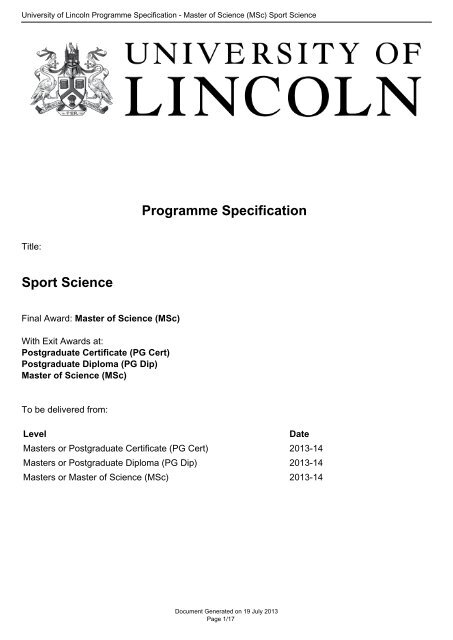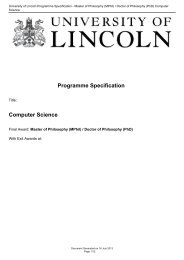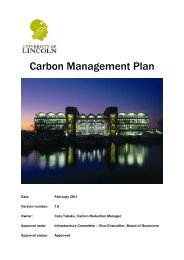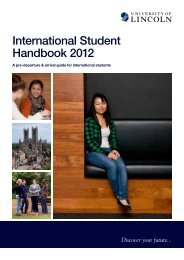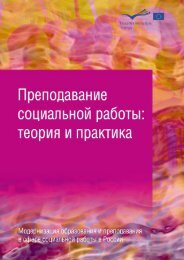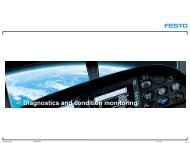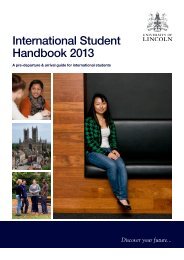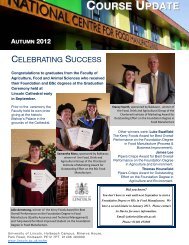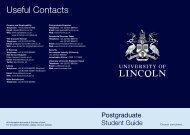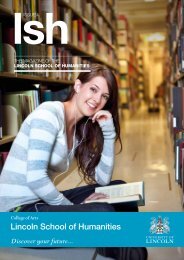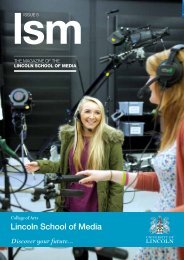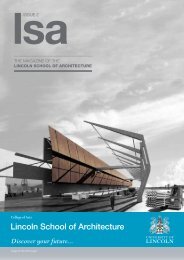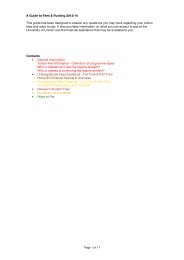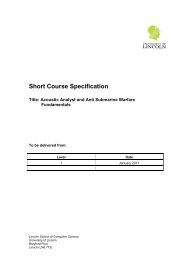Download the full 2013-14 Programme Specification for this course
Download the full 2013-14 Programme Specification for this course
Download the full 2013-14 Programme Specification for this course
You also want an ePaper? Increase the reach of your titles
YUMPU automatically turns print PDFs into web optimized ePapers that Google loves.
University of Lincoln <strong>Programme</strong> <strong>Specification</strong> - Master of Science (MSc) Sport Science<br />
<strong>Programme</strong> <strong>Specification</strong><br />
Title:<br />
Sport Science<br />
Final Award: Master of Science (MSc)<br />
With Exit Awards at:<br />
Postgraduate Certificate (PG Cert)<br />
Postgraduate Diploma (PG Dip)<br />
Master of Science (MSc)<br />
To be delivered from:<br />
Level<br />
Date<br />
Masters or Postgraduate Certificate (PG Cert) <strong>2013</strong>-<strong>14</strong><br />
Masters or Postgraduate Diploma (PG Dip) <strong>2013</strong>-<strong>14</strong><br />
Masters or Master of Science (MSc) <strong>2013</strong>-<strong>14</strong><br />
Document Generated on 19 July <strong>2013</strong><br />
Page 1/17
University of Lincoln <strong>Programme</strong> <strong>Specification</strong> - Master of Science (MSc) Sport Science<br />
Table Of Contents<br />
1. Introduction ............................................................................................................................... 3<br />
2. Basic <strong>Programme</strong> Data ............................................................................................................. 4<br />
3. <strong>Programme</strong> Description ........................................................................................................... 5<br />
3.1 Overview ................................................................................................................................. 5<br />
3.2 Aims and Objectives ................................................................................................................ 5<br />
3.3 Variations to Standard Regulations and Guidance ...................................................................... 5<br />
4. <strong>Programme</strong> Outcomes ............................................................................................................. 6<br />
4.1 Knowledge and Understanding ................................................................................................. 6<br />
4.2 Subject Specific Intellectual Skills .............................................................................................. 6<br />
4.3 Subject Specific Practical Skills ................................................................................................. 6<br />
4.4 Transferable Skills and Attributes .............................................................................................. 6<br />
5. Learning, Teaching and Assessment Strategies ................................................................... 8<br />
5.1. Learning and Teaching Strategy ............................................................................................... 8<br />
5.2. Assessment Strategy .............................................................................................................. 8<br />
6. <strong>Programme</strong> Structure .............................................................................................................. 10<br />
Appendix I - Curriculum Map ....................................................................................................... 11<br />
Appendix II - Assessment Map .................................................................................................... 12<br />
Appendix III - Benchmark Analysis ............................................................................................. <strong>14</strong><br />
Appendix IV - Benchmark Statements(s) .................................................................................... 16<br />
Document Generated on 19 July <strong>2013</strong><br />
Page 2/17
University of Lincoln <strong>Programme</strong> <strong>Specification</strong> - Master of Science (MSc) Sport Science<br />
1. Introduction<br />
This document describes one of <strong>the</strong> University of Lincoln's programmes using <strong>the</strong> protocols required<br />
by <strong>the</strong> UK National Qualifications Framework as defined in <strong>the</strong> publication QAA guidelines <strong>for</strong><br />
preparing programme specifications.<br />
This programme operates under <strong>the</strong> policy and regulatory frameworks of <strong>the</strong> University of Lincoln.<br />
Document Generated on 19 July <strong>2013</strong><br />
Page 3/17
University of Lincoln <strong>Programme</strong> <strong>Specification</strong> - Master of Science (MSc) Sport Science<br />
2. Basic <strong>Programme</strong> Data<br />
Final Award:<br />
<strong>Programme</strong> Title:<br />
Exit Awards and Titles<br />
Master of Science (MSc)<br />
Sport Science<br />
Postgraduate Certificate (PG Cert)<br />
Postgraduate Diploma (PG Dip)<br />
Master of Science (MSc)<br />
Subject(s)<br />
Sports and Exercise Sciences<br />
Mode(s) of delivery<br />
Full Time<br />
Part Time<br />
Is <strong>the</strong>re a Placement or Exchange<br />
UCAS code<br />
Awarding Body<br />
Campus(es)<br />
School(s)<br />
<strong>Programme</strong> Leader<br />
Relevant Subject Benchmark Statements<br />
Professional, Statutory or Regulatory Body<br />
Accreditation<br />
No<br />
University of Lincoln<br />
Lincoln Campus<br />
<strong>Programme</strong> Start Date <strong>2013</strong>-<strong>14</strong><br />
School Of Sport and Exercise Science<br />
Sandy Willmott (SWillmott)<br />
Document Generated on 19 July <strong>2013</strong><br />
Page 4/17
University of Lincoln <strong>Programme</strong> <strong>Specification</strong> - Master of Science (MSc) Sport Science<br />
3. <strong>Programme</strong> Description<br />
3.1 Overview<br />
The MSc Sport Science is an interdisciplinary programme based around core modules in<br />
biomechanics, physiology and psychology, but it has <strong>the</strong> flexibility <strong>for</strong> students to specialise in a<br />
discipline of <strong>the</strong>ir choice. The programme is being developed in consultation with <strong>the</strong> British<br />
Association of Sport and Exercise Sciences (BASES), who in <strong>the</strong> near future are planning to endorse<br />
postgraduate programmes.<br />
Students can enrol on <strong>the</strong> programme ei<strong>the</strong>r <strong>full</strong>-time (1 year) or part-time (2 years). Applications are<br />
welcome from graduates achieving a good degree at BSc level in a related discipline, or from those<br />
with a proven record of vocational experience in sport science.<br />
3.2 Aims and Objectives<br />
The MSc Sport Science programme aims to produce graduates who are critical thinkers and<br />
independent learners. The broad multidisciplinary and interdisciplinary content of <strong>the</strong> programme<br />
reflects an approach endorsed by <strong>the</strong> subject’s professional body BASES. The programme aims to<br />
produce students with <strong>the</strong> skills necessary to per<strong>for</strong>m as professional practitioners in <strong>the</strong> field of sport<br />
science.<br />
In addition, students are expected to:<br />
• systematically and creatively deal with complex issues in sport science and make sound<br />
judgements;<br />
• communicate <strong>the</strong>ir conclusions to specialist and non-specialist audiences;<br />
• demonstrate self-direction and originality in tackling and solving problems;<br />
• act autonomously in planning and implementing tasks at a professional level.<br />
3.3 Variations to Standard Regulations and Guidance<br />
None<br />
Document Generated on 19 July <strong>2013</strong><br />
Page 5/17
University of Lincoln <strong>Programme</strong> <strong>Specification</strong> - Master of Science (MSc) Sport Science<br />
4. <strong>Programme</strong> Outcomes<br />
<strong>Programme</strong>-level learning outcomes are identified below.<br />
Refer to Appendix I – Curriculum Map <strong>for</strong> details of how outcomes are deployed across <strong>the</strong><br />
programme.<br />
4.1 Knowledge and Understanding<br />
On successful completion of <strong>this</strong> programme a student will have knowledge and understanding of:<br />
1 Have knowledge and understanding of techniques applicable to research and advanced<br />
scholarship.<br />
2 Have knowledge and understanding of procedures and behaviours in professional practice.<br />
3 Have knowledge and understanding of ethical debates, procedures and conduct that impact<br />
upon research.<br />
4.2 Subject Specific Intellectual Skills<br />
On successful completion of <strong>this</strong> programme a student will be able to:<br />
4 Able to apply appropriate interventions based on <strong>the</strong>oretical foundations.<br />
5 Demonstrate a systematic understanding of knowledge and a critical awareness of current<br />
issues.<br />
6 Able to apply a conceptual understanding that enables evaluation of methodologies and <strong>the</strong><br />
ability to propose new hypo<strong>the</strong>ses.<br />
7 Demonstrate originality in applying knowledge to address problems within applied practice.<br />
4.3 Subject Specific Practical Skills<br />
On successful completion of <strong>this</strong> programme a student will be able to:<br />
8 Able to collect, record, analyse and critically interpret data.<br />
9 Demonstrate competence in using a range of techniques applicable to professional practice.<br />
10 Able to apply <strong>the</strong> use of laboratory equipment and field testing methods to analyse and<br />
improve per<strong>for</strong>mance.<br />
4.4 Transferable Skills and Attributes<br />
On successful completion of <strong>this</strong> programme a student will be able to:<br />
11 Demonstrate effective independent learning and <strong>the</strong> ability to per<strong>for</strong>m complex tasks to a high<br />
level.<br />
12 Able to apply a systematic approach to problem solving, demonstrating creativity and<br />
innovation.<br />
Document Generated on 19 July <strong>2013</strong><br />
Page 6/17
University of Lincoln <strong>Programme</strong> <strong>Specification</strong> - Master of Science (MSc) Sport Science<br />
13 Demonstrate a high level of competency in <strong>the</strong> skills of analysis and critical evaluation.<br />
<strong>14</strong> Able to communicate at an advanced level to a variety of audiences.<br />
For details of each module contributing to <strong>the</strong> programme, please consult <strong>the</strong> module specification<br />
document.<br />
Document Generated on 19 July <strong>2013</strong><br />
Page 7/17
University of Lincoln <strong>Programme</strong> <strong>Specification</strong> - Master of Science (MSc) Sport Science<br />
5. Learning, Teaching and Assessment Strategies<br />
5.1. Learning and Teaching Strategy<br />
Current approaches to teaching and learning are characterised by methods which aim to set<br />
challenging tasks, provide in<strong>for</strong>mative feedback and encourage independent learning. These are<br />
signposted by clear learning outcomes in programme specifications, module handbooks and lesson<br />
plans.<br />
The teaching and learning strategies aim to ensure that learning empowers <strong>the</strong> students to improve<br />
<strong>the</strong>ir levels of in<strong>for</strong>med and independent critical analysis and idea dissemination. The most commonly<br />
adopted methods <strong>for</strong> achieving <strong>the</strong>se aims consist of:<br />
• Lectures: Lectures provide a guide to a topic, highlighting important areas and providing in<strong>for</strong>mation<br />
on matters that may not be readily available from o<strong>the</strong>r sources. During lecture delivery students are<br />
encouraged to reflect upon <strong>the</strong>ir reading in relation to predefined subject <strong>the</strong>mes. Lectures and<br />
seminars are supported by Blackboard.<br />
• Seminars: Seminar-based interactive learning provide students with an opportunity to discuss<br />
<strong>the</strong>ories and issues, often based on set readings, problems or discussion topics. This approach<br />
encourages students to develop both <strong>the</strong>ir knowledge of a topic area and <strong>the</strong>ir skills of problem<br />
solving, critical analysis and evaluation.<br />
• Practical/ laboratory work: Many of <strong>the</strong> modules incorporate practical work in <strong>the</strong>ir teaching, where<br />
students have <strong>the</strong> opportunity to work while supervised by <strong>the</strong>ir tutor on practical skill development.<br />
Practical work is an integral and essential component of <strong>the</strong> programme.<br />
• Real world settings: Students will be able to take advantage of <strong>the</strong> Department’s network of<br />
external coaching and consultancy links to work directly with coaches and athletes. This will help<br />
students develop support skills and provide experiential learning which can lead to vocational<br />
opportunities.<br />
• Research-engaged teaching: The practice of research-engaged teaching aims to develop a sense<br />
of inquiry. The use of students as ‘producers’, encourages <strong>the</strong> student to develop <strong>the</strong> skills required<br />
to become an accredited sport scientist. Students learn how to undertake advanced research<br />
culminating in independent research studies, some of which will <strong>for</strong>m <strong>the</strong> basis <strong>for</strong> collaborative<br />
ventures between staff and students.<br />
• Independent study: The ethos is to develop independent learners. Students are set challenging<br />
tasks, provided with in<strong>for</strong>mative feedback to encourage <strong>this</strong> mode of learning. A virtual learning<br />
environment (Blackboard) is used to support <strong>this</strong> strategy.<br />
5.2. Assessment Strategy<br />
The assessment strategy adopted within <strong>the</strong> MSc Sport Science reflects <strong>the</strong> programme’s emphasis<br />
on applied practice and <strong>the</strong> development of a range of communication skills. However, in all<br />
assessments students will be expected to demonstrate an appropriate level of understanding of <strong>the</strong><br />
relevant <strong>the</strong>oretical issues. The design of <strong>the</strong> assessment strategy has regard <strong>for</strong> <strong>the</strong> following<br />
factors:<br />
• Assessment types are varied to meet <strong>the</strong> subject-specific demands of each module.<br />
• The student is provided with <strong>the</strong> opportunity to collect, organise, analyse and interpret data/<br />
in<strong>for</strong>mation through a variety of assessments including written assignments, laboratory reports, oral<br />
presentations, practical demonstrations and <strong>for</strong>mal oral examinations.<br />
• All assessment tasks will provide clear criterion-referenced grade descriptors so that rigour,<br />
consistency and equality of assessment will be ensured. This will be achieved through team planning<br />
and staff moderation.<br />
• The development of ‘employability’ skills is enhanced by experiential learning, and opportunities<br />
Document Generated on 19 July <strong>2013</strong><br />
Page 8/17
University of Lincoln <strong>Programme</strong> <strong>Specification</strong> - Master of Science (MSc) Sport Science<br />
<strong>for</strong> engaging in ‘real world’ assessments will be provided through <strong>the</strong> Department’s engagement<br />
with individuals and organisations outside <strong>the</strong> University.<br />
• The development and assessment of programme outcomes will include <strong>the</strong> attainment of high-level<br />
intellectual skills such as critical analysis and evaluation.<br />
• Assessments will develop independent researchers who are required to develop practical<br />
competencies within a laboratory/ field setting.<br />
• Formative assessments will be utilised to enable <strong>the</strong> monitoring of progression. Examples of such<br />
assessments are simulation activities within <strong>the</strong> laboratory and field environment, small presentations<br />
and sample/ revision questions.<br />
• As a general guideline <strong>the</strong> assessment strategy adopted will be that <strong>the</strong> components of assessment<br />
<strong>for</strong> a 15 credit point module will total no more than 3,000 words or equivalent, and <strong>for</strong> a 30 credit<br />
point module 6,000 words or equivalent.<br />
• Mapping of workloads will avoid undue pressure being placed on students by assessments<br />
coinciding.<br />
Document Generated on 19 July <strong>2013</strong><br />
Page 9/17
University of Lincoln <strong>Programme</strong> <strong>Specification</strong> - Master of Science (MSc) Sport Science<br />
6. <strong>Programme</strong> Structure<br />
The total number of credit points required <strong>for</strong> <strong>the</strong> achievement of Postgraduate Certificate (PG Cert)<br />
is 60.<br />
The total number of credit points required <strong>for</strong> <strong>the</strong> achievement of Postgraduate Diploma (PG Dip) is<br />
120.<br />
The total number of credit points required <strong>for</strong> <strong>the</strong> achievement of Master of Science (MSc) is 180.<br />
Masters<br />
Title Credit Rating Core / Optional<br />
Research Methods and Skills <strong>2013</strong>-<strong>14</strong> 15 Core<br />
Biomechanical Assessment and Research <strong>2013</strong>-<strong>14</strong> 15 Core<br />
Sport Physiology <strong>2013</strong>-<strong>14</strong> 15 Core<br />
Delivering Applied Sport Psychology <strong>2013</strong>-<strong>14</strong> 15 Core<br />
Investigation and Communication in Applied Sport Science <strong>2013</strong>-<strong>14</strong> 30 Core<br />
Applied Sport Science Support <strong>2013</strong>-<strong>14</strong> 30 Core<br />
Sport Science Research Project 2012-13 60 Core<br />
Document Generated on 19 July <strong>2013</strong><br />
Page 10/17
University of Lincoln <strong>Programme</strong> <strong>Specification</strong> - Master of Science (MSc) Sport Science<br />
Appendix I - Curriculum Map<br />
This table indicates which modules assume responsibility <strong>for</strong> delivering and ordering particular programme learning outcomes.<br />
Key: Delivered and Assessed Delivered Assessed<br />
Masters<br />
Applied Sport Science Support <strong>2013</strong>-<strong>14</strong><br />
Biomechanical Assessment and Research<br />
<strong>2013</strong>-<strong>14</strong><br />
Delivering Applied Sport Psychology <strong>2013</strong>-<strong>14</strong><br />
Investigation and Communication in Applied<br />
Sport Science <strong>2013</strong>-<strong>14</strong><br />
Research Methods and Skills <strong>2013</strong>-<strong>14</strong><br />
Sport Physiology <strong>2013</strong>-<strong>14</strong><br />
Sport Science Research Project 2012-13<br />
PO1 PO2 PO3 PO4 PO5 PO6 PO7 PO8 PO9 PO10 PO11 PO12<br />
Applied Sport Science Support <strong>2013</strong>-<strong>14</strong><br />
Biomechanical Assessment and Research <strong>2013</strong>-<strong>14</strong><br />
Delivering Applied Sport Psychology <strong>2013</strong>-<strong>14</strong><br />
Investigation and Communication in Applied Sport Science <strong>2013</strong>-<strong>14</strong><br />
Research Methods and Skills <strong>2013</strong>-<strong>14</strong><br />
Sport Physiology <strong>2013</strong>-<strong>14</strong><br />
Sport Science Research Project 2012-13<br />
PO13<br />
PO<strong>14</strong><br />
Document Generated on 19 July <strong>2013</strong><br />
Page 11/17
University of Lincoln <strong>Programme</strong> <strong>Specification</strong> - Master of Science (MSc) Sport Science<br />
Appendix II - Assessment Map<br />
This table indicates <strong>the</strong> spread of assessment activity across <strong>the</strong> programme. Percentages indicate assessment weighting.<br />
Masters<br />
01 02 03 04 05 06 07 08 09 10 11 12<br />
Applied Sport Science Support <strong>2013</strong>-<strong>14</strong><br />
Biomechanical Assessment and Research<br />
30 30 40<br />
<strong>2013</strong>-<strong>14</strong><br />
Delivering Applied Sport Psychology <strong>2013</strong>-<strong>14</strong> 100<br />
Investigation and Communication in Applied<br />
Sport Science <strong>2013</strong>-<strong>14</strong><br />
Research Methods and Skills <strong>2013</strong>-<strong>14</strong> 100<br />
Sport Physiology <strong>2013</strong>-<strong>14</strong> 40 60<br />
Sport Science Research Project 2012-13<br />
13 <strong>14</strong> 15 16 17 18 19 20 21 22 23 24<br />
Applied Sport Science Support <strong>2013</strong>-<strong>14</strong> 30 30 40<br />
Biomechanical Assessment and Research<br />
<strong>2013</strong>-<strong>14</strong><br />
Delivering Applied Sport Psychology <strong>2013</strong>-<strong>14</strong><br />
Investigation and Communication in Applied<br />
20 80<br />
Sport Science <strong>2013</strong>-<strong>14</strong><br />
Research Methods and Skills <strong>2013</strong>-<strong>14</strong><br />
Sport Physiology <strong>2013</strong>-<strong>14</strong><br />
Sport Science Research Project 2012-13<br />
Applied Sport Science Support <strong>2013</strong>-<strong>14</strong><br />
Biomechanical Assessment and Research<br />
<strong>2013</strong>-<strong>14</strong><br />
25 26 27 28 29 30 31 32 33 34 35 36<br />
Document Generated on 19 July <strong>2013</strong><br />
Page 12/17
University of Lincoln <strong>Programme</strong> <strong>Specification</strong> - Master of Science (MSc) Sport Science<br />
Delivering Applied Sport Psychology <strong>2013</strong>-<strong>14</strong><br />
Investigation and Communication in Applied<br />
Sport Science <strong>2013</strong>-<strong>14</strong><br />
Research Methods and Skills <strong>2013</strong>-<strong>14</strong><br />
Sport Physiology <strong>2013</strong>-<strong>14</strong><br />
Sport Science Research Project 2012-13 70 30<br />
Applied Sport Science Support <strong>2013</strong>-<strong>14</strong><br />
Biomechanical Assessment and Research<br />
<strong>2013</strong>-<strong>14</strong><br />
Delivering Applied Sport Psychology <strong>2013</strong>-<strong>14</strong><br />
Investigation and Communication in Applied<br />
Sport Science <strong>2013</strong>-<strong>14</strong><br />
Research Methods and Skills <strong>2013</strong>-<strong>14</strong><br />
Sport Physiology <strong>2013</strong>-<strong>14</strong><br />
Sport Science Research Project 2012-13<br />
37 38 39 40 41 42 43 44 45 46 47 48<br />
Applied Sport Science Support <strong>2013</strong>-<strong>14</strong><br />
Biomechanical Assessment and Research <strong>2013</strong>-<strong>14</strong><br />
Delivering Applied Sport Psychology <strong>2013</strong>-<strong>14</strong><br />
Investigation and Communication in Applied Sport Science <strong>2013</strong>-<strong>14</strong><br />
Research Methods and Skills <strong>2013</strong>-<strong>14</strong><br />
Sport Physiology <strong>2013</strong>-<strong>14</strong><br />
Sport Science Research Project 2012-13<br />
49 50 51 52 EP<br />
Document Generated on 19 July <strong>2013</strong><br />
Page 13/17
University of Lincoln <strong>Programme</strong> <strong>Specification</strong> - Master of Science (MSc) Sport Science<br />
Appendix III - Benchmark Analysis<br />
This table maps programme learning outcomes to relevant QAA subject benchmark statements or PSRB guidelines.<br />
Knowledge and Understanding<br />
PO1<br />
PO2<br />
PO3<br />
N/A<br />
Subject Specific Intellectual Skills<br />
PO4<br />
PO5<br />
PO6<br />
PO7<br />
N/A<br />
Subject Specific Practical Skills<br />
PO8<br />
PO9<br />
PO10<br />
N/A<br />
Transferable Skills and Attributes<br />
N/A<br />
Document Generated on 19 July <strong>2013</strong><br />
Page <strong>14</strong>/17
University of Lincoln <strong>Programme</strong> <strong>Specification</strong> - Master of Science (MSc) Sport Science<br />
PO11<br />
PO12<br />
PO13<br />
PO<strong>14</strong><br />
Document Generated on 19 July <strong>2013</strong><br />
Page 15/17
University of Lincoln <strong>Programme</strong> <strong>Specification</strong> - Master of Science (MSc) Sport Science<br />
Appendix IV:<br />
Benchmark Benchmark Statement(s)<br />
Document Generated on 19 July <strong>2013</strong><br />
Page 16/17
Powered by TCPDF (www.tcpdf.org)<br />
University of Lincoln <strong>Programme</strong> <strong>Specification</strong> - Master of Science (MSc) Sport Science<br />
N/A - Benchmark Statements Not Applicable<br />
Document Generated on 19 July <strong>2013</strong><br />
Page 17/17


